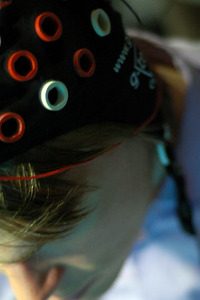
Science journalist Christie Nicholson discussed the intricacies and implications of recent neurological research that has shown promise in connecting mental activity to physical output – without the regular neural pathways. This type of research gives hope to those suffering from physical disabilities (multiple sclerosis and paralysis patients, for example), but it also enables technological advances ranging from intriguing to alarming.
One of the first major breakthroughs came when an owl monkey named Belle moved a robotic arm via an electroencephalographic (EEG) monitor that was connected to her brain. The arm was in a separate lab, 600 miles away. Further work with primates enabled a macaque to actually feed herself with the same EEG technology.
Then came BrainGate, a “neural interface system” that gave pioneer user Matt Nagle, a tetraplegic patient, certain movement abilities that a stabbing injury had taken away from him. The technology has evolved to the point that implantable chips tested in mice functioned like artificial organs.
Such advancement obviously has positive and negative implications. We could be witnessing the beginning of the end for debilitating afflictions like amyotrophic lateral sclerosis and paralysis, but this progress will certainly take years. And there is always the looming threat of such technology being used for bad. Nicholson concluded her talk with a reference to author Raymond Kurzweil’s idea of technological singularity, a point at which robotic intelligence will surpass that of humans. The brain-as-computer-interface idea is for some a monumental achievement in medicine, but others believe it could harm many more than it helps.

Permalink
I love hearing about stuff like this. Using only your brain to control functions is so futuristic, it’s something straight out of a movie. It’s amazing to know that the things we imagine can actually be possible.
I know that there may a threat of the technology being used for evil, but people are still going to pursue this avenue for its benefits regardless. Playing devil’s advocate here, weren’t people in the past scared that bad things could happen with some current technologies? If we put a stop to all the technologies that could have negative implications, we would be stuck in the ice age. It’s my belief that things tend to balance out, even if it is a bumpy road along the way.
Great post! Hope to use my brain as a computer ASAP,
Kristen Williams